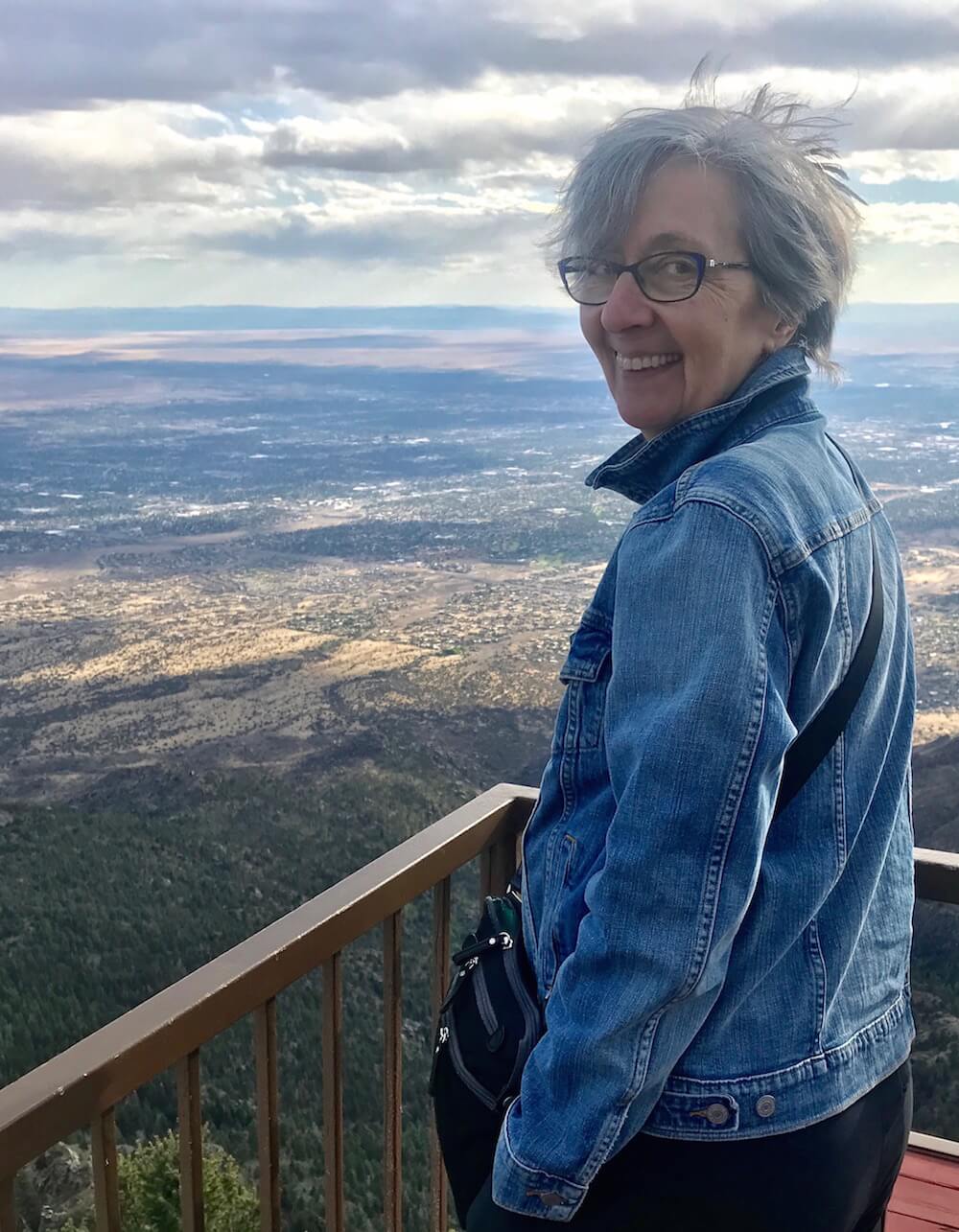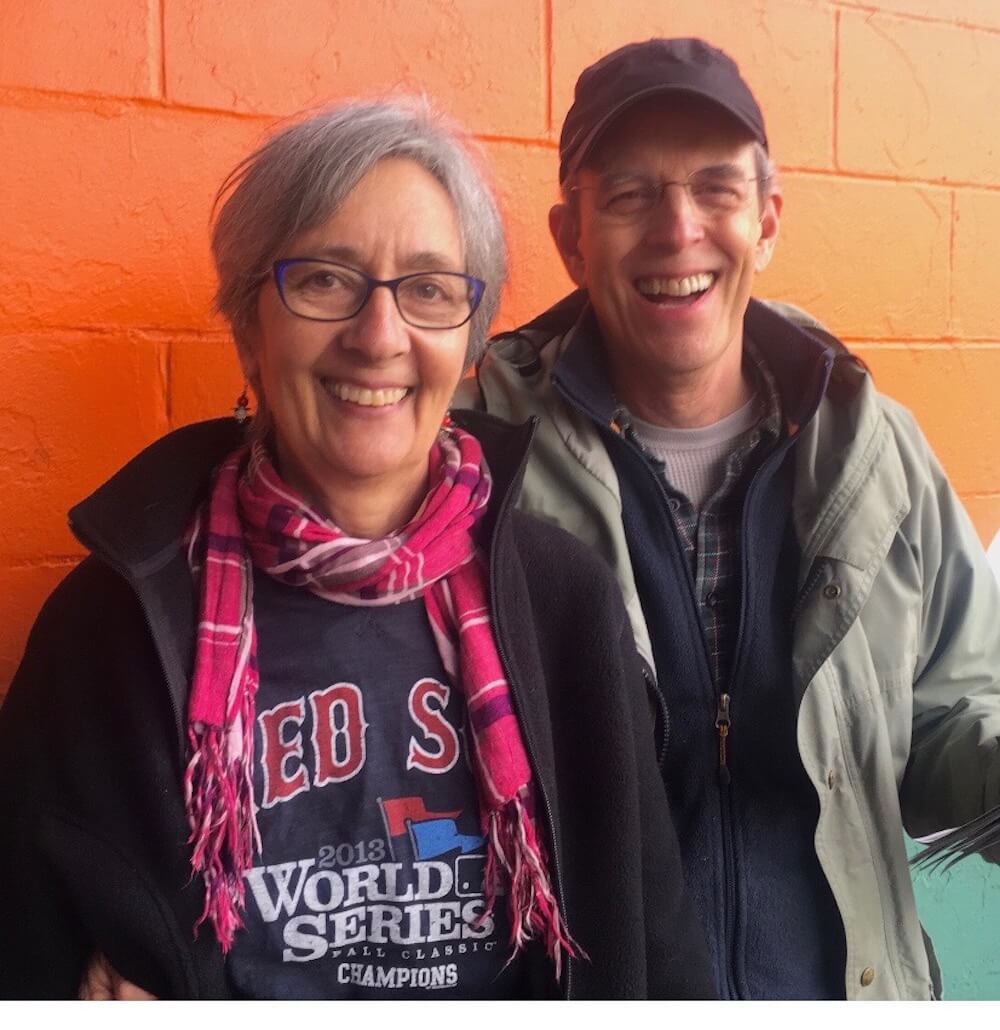When Fran Austin’s ovarian cancer recurred after two rounds of chemotherapy, she found herself looking for a silver lining to the dark cloud of her disease. And she found it: Genetic profiling of her tumor identified her as an ideal candidate for an immunotherapy clinical trial, which has since shrunk her tumor by 60 percent and left her feeling strong and her condition stable more than a year later.
Austin thought she just had a bladder infection when she went to see her doctor about a slight fever in January 2015. The doctor detected an abdominal mass, which a CAT scan later revealed to be the size of a soccer ball. A surgeon was able to remove most, but not all, of the mass, and a biopsy determined it was stage IIIC ovarian cancer.
“The diagnosis was a complete surprise,” she says. “I had been feeling fine.”
Although she planned to undergo chemotherapy at another Boston-area hospital, Austin came to Dana-Farber to get a second opinion on her condition and treatment plan from Panogiotis Konstantinopoulos, MD, PhD, director of translational research and a physician in Dana-Farber’s Susan F. Smith Center for Women’s Cancers. He approved of her treatment plan, but went one step further and asked if he could conduct a genetic profile of her tumor as it was more likely than not that her disease would recur at some point. It was a decision that would prove fruitful for Austin later on.
“Here at Dana-Farber, we do our homework early,” Konstantinopoulos says. “That way we can have the information on hand to know exactly what we could do down the road.”
After her first round of chemo ended in July 2015, Austin’s scans remained clear for 14 months. She started working out at her local YMCA to regain her strength and stamina after the fatigue of treatment.
Unfortunately, her cancer returned. In September 2016, she started a second-line carboplatin-based chemotherapy regimen that Konstantinopoulos had recommended. Five months later, she developed an allergy to carboplatin and had to discontinue the treatment, and although her scans were clear at that time, the cancer returned again in July 2017.
It was at this point that Konstantinopoulos’ earlier “homework” paid off. The genetic profile of Austin’s tumor had detected two characteristics of the cancer that would respond to two drugs being used in a new clinical trial.
“It made her the perfect candidate for the trial,” Konstantinopoulos recalls.
The trial combined the PARP inhibitor niraparib, which impairs the cancer’s cells ability to repair itself, with the immunotherapy drug pembrolizumab, which targets the PD-1 checkpoint protein on immune system T-cells.
“I was thrilled to have the option of the clinical trial,” Austin says. “It’s exciting to be breaking new ground.”
Austin has been pleasantly surprised at how much easier the clinical trial regimen is compared to chemotherapy. She takes two pills daily and only has to come into the hospital once every three weeks for a one-hour infusion.
“My quality of life has improved so much,” she says. “I don’t feel tied down to the hospital. In between infusions, my husband and I could travel again, which we really enjoy.”
She kept waiting for side effects to kick in, but aside from needing an adjustment to her thyroid medication, the side effects have been minor.
When her first scans in late December showed a significant shrinkage of her tumor, the news was the perfect Christmas present. Each scan since has brought only positive news.
Austin celebrated her one-year anniversary on the trial this August, when it was confirmed that her tumor had shrunk by 60 percent.
“Her response is unprecedented,” Konstantinopoulos says. “It’s life-changing. It’s not only keeping her alive but is changing the natural history of her disease.”
He instructed Austin’s husband, John Norton, to celebrate the anniversary by “figuring out a nice gift for his wife to make her happy – doctor’s orders.”
The trial has already given her a gift that no husband or money can buy: more time together.
“It’s fantastic to hit this milestone, but also a bit unreal,” Austin says. “Ovarian cancer is not considered curable, so there’s this cap to your elation about things working. But I feel great. I’m living a normal life again, and I’ll stay on the trial as long as I can.”


I have been diagnosed with ovarian cancer my surgery was 10 days ago and they could not remove it all I take carbo and taxol chemotherapy and I’m waiting to find out what the next steps are. I am a Dana-Farber patient.
Hi Carol,
Thank you for reading. Unfortunately, we cannot provide medical advice without a consultation. Please direct your questions to your care team.
Best,
DFCI
I will say a prayer for you. You will beat it. All the best to you.
It’s nice to hear that ovarian cancer Tx can have a 2 steps forward-1 step back storyline, albeit a guarded ‘temporary’ status. The improvement in QOL during Tx is encouraginging to many as sometimes the chemo can become subject to QOL debate. Lastly, many expense savings are evaluated and started at the patient care level. I can’t say how important it is to move forward in ‘up-front’ genetic and other Tx plan testing. I am not in the health care field. But logically such testing should eventually prove to be a savings and it should be an ethical issue for all institutions creating Tx plans for cancer patients. I don’t know Fran or her husband but I extend warm well wishes and thanks for sharing their story. (I am not in the healthcare field).
I am a Dana Farber patient, diagnosed with Stage IIIC ovarian cancer (OC) in November 2016.
After first line of tx’t [neo-adjuvant carbo/taxol x 3 cycles, surgery by Dr. Horowitz, (Elohim’s blessings to him!), and adjuvant tx’t x 3 cycles], I recurred approx 10 mos. later (detected by CA-125 testing) . I did not qualify for a trial at that time, so I proceeded with 6 cycles of carbo/doxil. I am now in remission, having completed tx’t Aug 2018. I am waiting to hear if I can qualify for a vaccine trial at DF. I believe the future for OC extirpation is in vaccine therapy (perhaps one day as a single agent even!)
A note to all reading this: if you have funds to support research, DF is a worthy investment. Thank you all in advance. Life is precious.
I was diagnosed with ovarian cancer stage IIIc in feb 2012. I have had 3 recurrances since – I visited DFCI just prior to my 3rd recurrance in Feb of 2016 and met with Dr K. I donate my blood for evaluation for their genetic research and was told I could contact after 6 months with “results” or info on my cancer (would i be a candidate for immunotherapy, etc). When I called, I was given run around and no information. Not even a call back when requested. Entered a black hole – since then cancer has returned 2X – very dissappointed on many levels.
Dear Mary,
I am so sorry to hear about this situation. The Patient/Family Relations Office can provide you with assistance. They can be reached directly at 617-632-3417. Or, if you prefer, you can page them through the hospital operator at 617-632-3000, pager ID #42137, so they may contact you.
Best,
DFCI
I was diagnosed with stage IIIc ovarian cancer in March 2000. After surgery and taxol/carboplatin chemo I was in remission for 6 months. The cancer returned. I underwent two more tumor debulkings and participated in two Phase I vaccine clinical trials. I have been disease free since 2003.
DFCI saved my life!
I was diagnosed with stage IIIc ovarian cancer in March 2000 and underwent tumor debunking surgery followed by taxol/carboplatin chemo.
The cancer returned after 6 months.
From 2001-2003 I participated in two Phase I vaccine clinical trials.
I’ve been disease free since.
DFCI saved my life!